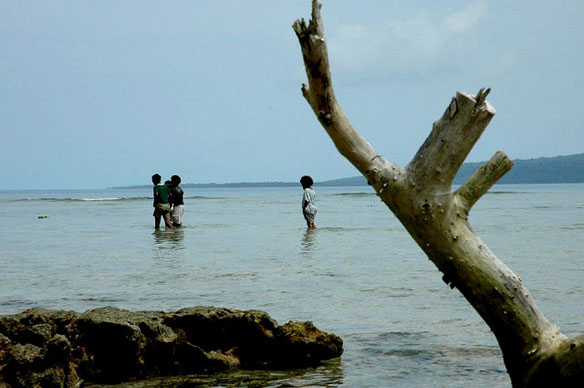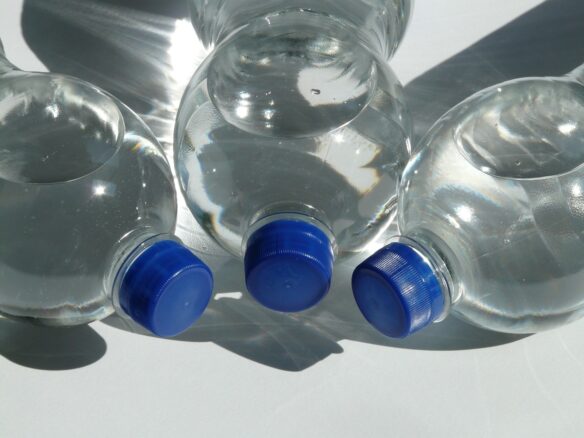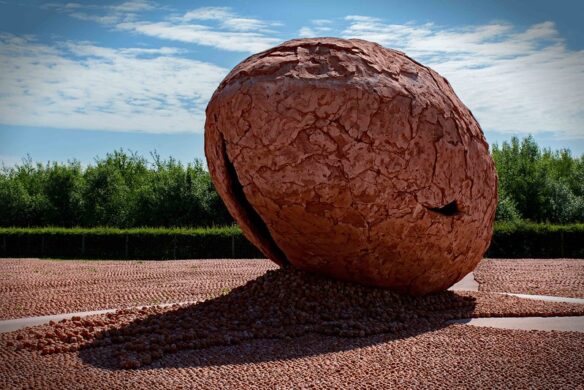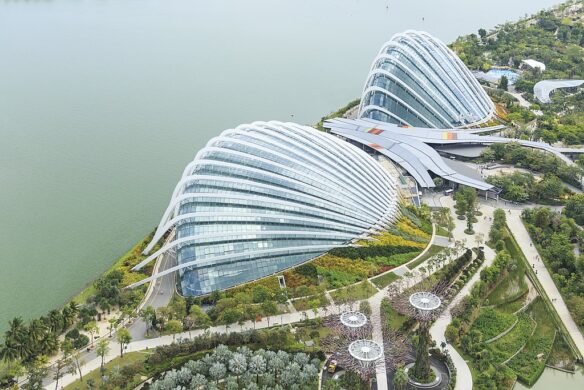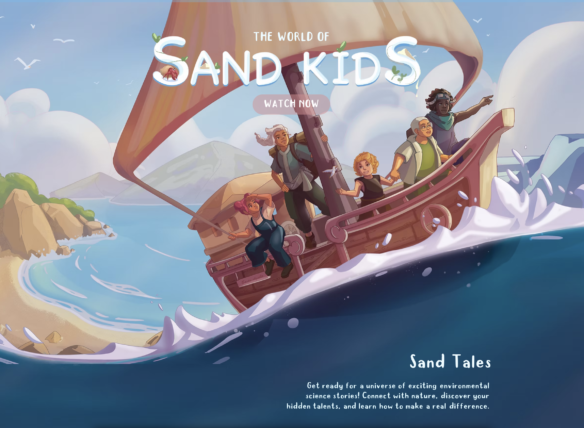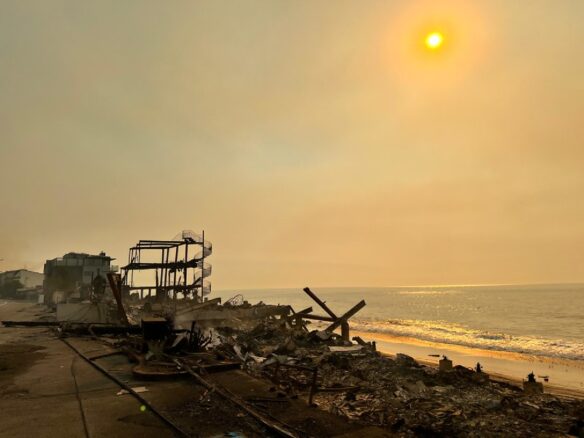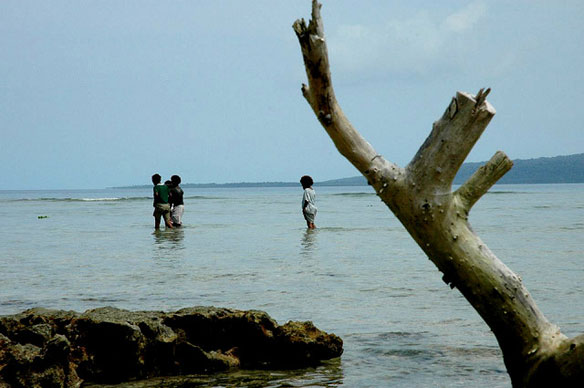
“The melt has to go somewhere”. In Vanuatu, rising sea levels have forced the relocation of entire villages. Caption and Photo Source: Meredith james-Johnstone
By Leigh Phillips
Pacific island states on the frontline of climate change are to receive €90m (£76m) in EU cash for climate-related projects in return for siding with the European bloc at international climate negotiations.
The European Union’s development commissioner, Andris Piebalgs, headed to Vanuatu Wednesday to unveil funding for climate-related projects.
The funding comprises redirected resources, according to the European Commission, and will back projects such as mangrove replanting, watershed reforestation, rainwater harvesting, soil retention, raising of infrastructure, disaster preparedness and moving hospitals to higher ground.
The cash may appear small in EU terms, but represents as much as 19.5% of the nominal GDP of Vanuatu, and more than 12 times the GDP of the Pacific Islands Forum’s poorest member, Niue.
Such an injection of cash does not come without strings attached however. Piebalgs is to make the funding announcement at a high-level climate conference on Vanuatu organised by the European commission where the he will present an EU-Pacific action plan for the island states to sign.
The document requires the states to embrace “joint positions on the international stage” as part of a “stronger Pacific-EU political dialogue on climate change”.
Climate negotiations have been at a stalemate with only moderate advances made since the global UN conference in Copenhagen in 2009, as Western countries try to convince the developing world to commit to binding emissions reductions.
Since 2009, the EU has revamped its climate diplomacy strategy, with France and the UK dispatched to try to pry some African states away from what Brussels officials describe as an “awkward squad” of refusenik nations. Germany has been tasked with the Pacific.
Isaac Valero-Ladron, the EU’s climate spokesman, said that the bloc has had a lot of success in the region, which contains countries with some of the lowest GDP per capita in the world. “If we put money on the table, it really creates a constructive atmosphere and good policies.”
“The Pacific islands are a very helpful, positive partner on the international level. Our positions are very close.”
The funds, which according to the commission are redeployments of existing development funds rather than new sources of climate financing as many development groups also demand – support projects that include mangrove replanting, watershed reforestation, rainwater harvesting, soil retention and the raising of infrastructure.
In advance of the meeting, the commissioner called on EU member states to increase their funds to the region.
Pacific Islands Climate Change Conference: European Union Calendar
Excerpt from Europa, EU Calendar
Between 3 and 4 March, 2011, European Commissioner for Development, Andris Piebalgs, will participate in Conference on Climate Change in Vanuatu and sign an Action Plan to enhance Pacific-EU cooperation on climate change.
Some of the small Pacific islands are under the threat to disappear. They dramatically need increased aid.which, Commissioner Piebalgs will call EU member states and other international partners and donors to engage politically and financially in addressing climate change challenges faced by Pacific Countries and Territories.
The Commissioner will also sign four programmes which show EU determination to combat climate change and poverty in the Pacific for €50.4 million in total. Two of them cover specifically Vanuatu and Solomon Islands climate resilience specific needs. One will support strategic actions on adaptation in 9 Pacific Small Island states and prepare those countries to absorb efficiently the expected international climate fast start funds. The second regional project, to be implemented by the University of South Pacific, seeks to strengthen capacity building, community engagement and adaptive actions along with applied research.
The background:
Pacific islands are very isolated developing countries which have already suffered from regular natural disasters. In the worse case scenario, some islands could disappear due to rising sea levels and increasing erosion occurring from intense storms. All these changes infringe on hunting, fishing and the quality water resources therefore contribute to increased poverty in the region. In order to achieve the Millennium Development Goals on time the poverty must be also addressed in the Pacific region.
The European Commission provides development aid to the Pacific, which amounts €600 million for 2008-2013. It has reached a 60% increase between the 9th European Development Fund (2002-2007) and the 10th EDF (2007-2013).. A specific support needed to be devoted to address the negative impact of climate change in the Pacific. The Commission is politically and financially leading this EU effort. Together with Pacific partners, the Commission is actively engaged in financial terms, with €90 million in ongoing and already planned development cooperation projects and programmes at country and regional level for the period 2008-2013.
The event:
Building on the Cancun Climate Change Conference, the High Level conference on Climate Change in the Pacific will be hosted by Vanuatu on 4 March and is organised by the European Commission. Commissioner Piebalgs will make the introductory speech and Prime Minister of Vanuatu will do the closing remarks. An action plan will be presented for endorsement by the Conference.
A press conference will be organised on site.
Commissioner Piebalgs will visit a first wind farm implemented in the Vanuatu archipelago, designed to help meet the country’s growing energy needs. He will also visit the National Disaster Centre and Meteorological Services to assess local capacities deployed at the forefront of disaster risk management.

